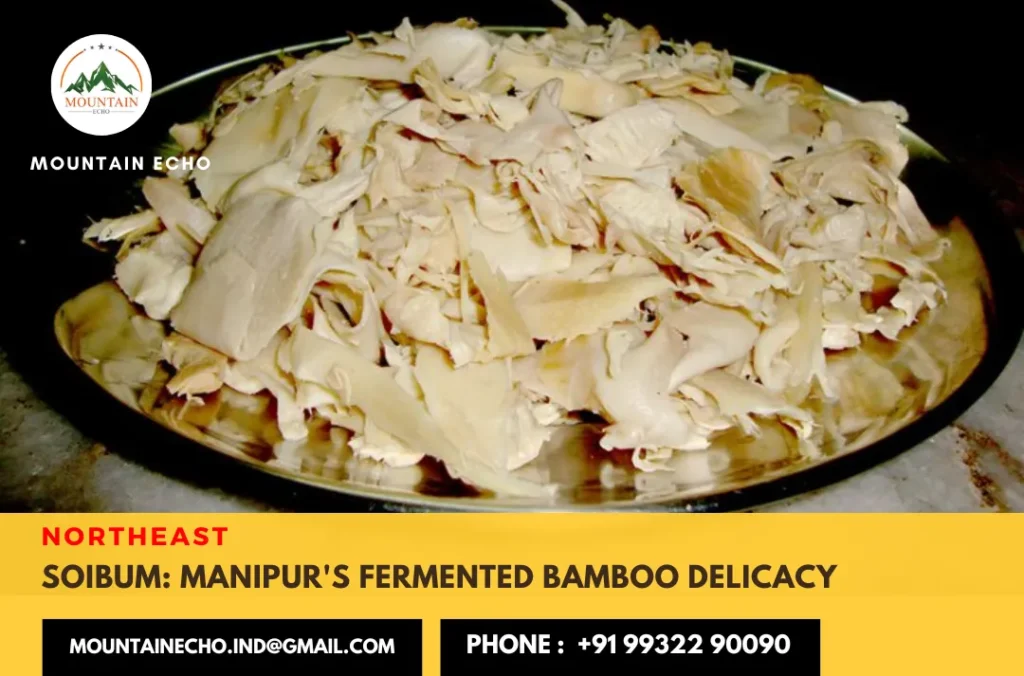Soibum: Manipur’s fermented bamboo delicacy
WhatsApp Channel
Join Now
Manipur, a beautiful state in northeastern India, is known for its rich cultural heritage and diverse cuisine. One of the many culinary treasures that originate from this region is Soibum, a traditional fermented bamboo shoot. Soibum is not just a food product, it’s a representation of Manipur’s rich culinary heritage and the skill of its people. Let’s explore the fascinating process of making Soibum and discover its nutritional value.
The process of making Soibum
Selection of Bamboo Shoots: The process begins with the selection of tender bamboo shoots. Various bamboo species like Bambusa tulda (Utang), B. balcona (Ching saniebi), Wanap, Unap, Dendrocalamus hamiltonii, Pecha, Melacona bambusoide (Moubi/Muli), and others are used. The outer casings of these young shoots are removed.
Cutting and Washing: The inner part of the bamboo shoots is then cut into pieces and thoroughly washed to remove any impurities.
Submerging in Water: The bamboo shoot tips are submerged in an earthen pot filled with water. The sour liquid from a previous batch of fermented bamboo tips is added as a starter for the fermentation process. The tips are then left to ferment in the solution at a room temperature for almost 6-7 days.
Natural Fermentation: After draining the solution, the cleaned bamboo pieces are left to ferment naturally in a pot for a period ranging from 3 to 12 months. During this time, the bamboo undergoes a transformation, developing its unique taste and aroma. To enhance the flavor, leaves known as Heibung are added to the fermenting container.
Consuming Soibum
Soibum finds its way into the hearts and plates of the Meiteis and other people living in the state as a cherished dish. When the Soibum is ready, it can be used to prepare a variety of dishes, including pickles and curries. Typically, it is served with steamed rice as part of a regular meal. You can also find Soibum readily available in the local markets of Manipur, where Meitei women sell it as a vegetable. Some of the finest Soibum is believed to be prepared in Bishnupur Village of Manipur and is highly sought after in local markets.
Nutritional Value of Soibum
Apart from its unique taste, Soibum also offers some nutritional benefits. Here’s a glimpse of its nutritional composition:
– Moisture: 92%
– Acidity: 0.98%
– pH: 3.9
– Fat: 3.2% (Dry Matter)
– Carbohydrate: 47.2% (Dry Matter)
– Protein: 36.3% (Dry Matter)
– Food Value: 362.8 kcal/100 g (Dry Matter)
– Calcium (Ca): 16.0 mg/100 g
– Potassium (K): 212.1 mg/100 g
– Sodium (Na): 2.9 mg/100 g
These nutritional components make Soibum a wholesome addition to the Manipuri diet.
Its unique taste and nutritional value make it a cherished ingredient in Manipuri cuisine. So, if you ever have the chance to visit Manipur, don’t miss the opportunity to savor this delicious and culturally significant delicacy. It’s noteworthy that this food product is primarily made by Meitei women in Manipur, showcasing their culinary expertise and preserving this cultural tradition.
Telegram Channel
Join Now



